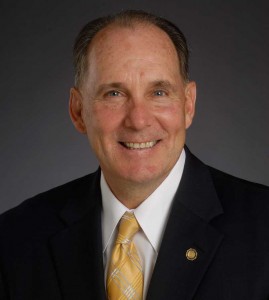Local state rep. sees cuts in Welfare, smaller education cuts as likely
By Mike McGann, Editor, UnionvilleTimes.com
In the immortal words of the author Douglas Adams, “Don’t panic.”
Those are the words of advice coming from at least one local state legislator, who, while he said he supports much of Gov. Tom Corbett’s proposed budget, he also noted that the state budget process is a long one and that the final budget adopted by the state legislature sometime in June is probably going to look a little bit different, so people shouldn’t take all of the proposed cuts — especially in education — at face value.
State Rep. Steve Barrar (R-160, who represents Chadds Ford, Birmingham and Pocopson in the Unionville area) is a veteran of the state budget process and said Thursday he expects that the legislature will make some adjustments to Gov. Corbett’s budget proposal — just as has been done with virtually every budget proposed since he went to Harrisburg in 1997.
“People have to remember this is a proposed budget,” he said. Still, it appears the governor kept his cards close to his vest, surprising even a few of his fellow Republicans with some of his budget priorities.
“I was surprised at how deep the education cuts were,” Barrar said, explaining that he was equally surprised by increases in the state Welfare budget — about $600 million — especially after critics in both parties suggested there might be as much as $1 billion in waste and fraud in the program. The nearly 50% proposed cut for higher education funding was a bit startling, too. “I expected about a 20% cut,” he said.
Corbett’s budget calls for cuts of $1.3 billion in education funding, including $550 million in basic education funds to public schools and more than $600 million in cuts to the state’s universities and colleges — about half of the current state subsidy to the schools. The cut in basic education funding would hit some Chester County districts hard — Coatesville Area School District stands to lose about $8 million — although the Unionville-Chadds Ford School District is slated to lose $478,327.
Barrar said that he and his colleagues in the house Republican Caucus planned to dig for funds in the Welfare budget — some of that $1 billion in alleged waste and fraud — and restore some of the education funding.
He made it clear that supports Corbett’s call for a pay freeze for teachers and other school district employees.
“State employees have given back,” Barrar said. “Staff for the state legislature hasn’t gotten a raise since 2006. Teachers and administrators have to recognize the financial realities.”
Another change in the budget Barrar said he thinks is likely are cuts to the roughly $300 million budget for the legislature. Corbett’s plan shaves a little more than 1% from the budget, while Barrar makes it clear that he and his colleagues are ready to slash more deeply.
“We can’t make all of these other cuts and not cut our own budget,” he said, noting that Speaker of the House Sam Smith has pushed house members to cut spending across the board, from mailings to district offices. Staffing could be cut, as well, Barrar said.
Barrar said he was pleased that the governor wants to fully staff the State Police — which has faced trooper reductions since 2008 — but is little worried about the source of the funds: the Highway Trust Fund, which is supported by the Liquid Fuels tax. Barrar said he was concerned that taking money from that fund could further restrict already tight funds for road repairs.
The long-time state legislator said he agreed with doing away with the so-called “Walking Around Money” — even though he said he’s used the program to fund worthy projects in the 160th District. Unfortunately, he said, what started as a way for legislators to support local projects that might otherwise get overlooked was misused and abused by members in both parties. He said that party leaders used it as a weapon to get votes for various measures and some members pushed money to questionable projects.
“A lot of legislation was passed using WAM,” he said. “It became an extremely tainted program.”
Another change Barrar said he sees as likely is some sort of severance tax for the Marcellus Shale Gas Field.
Barrar said that a smaller tax than proposed by Democrats in 2010, will likely be supported — but not as a measure to solve the commonwealth’s fiscal problems. The smaller tax would support additional regulatory costs to the state Department of Environmental Protection and local municipalities where drilling is taking place.
“It’s not a panacea,” he said, noting that he thought that the legislature would have enough votes to override an expected veto by the governor.
One aspect of Corbett’s budget that Barrar says he enthusiastically supports is the restoration of funding for college tuition for National Guard members — the tuition reimbursement is part of the deal guard members get when they sign up for service, but the fund to pay for their college education ran dry in 2010 without former Gov. Ed Rendell keeping his pledge to find funds for it before he left office in January.
“We made a commitment to pay these college costs,” said Barrar, the new chair of the House Veterans Affairs and Emergency Preparedness Committee. “The fund went dry and it’s good to see Gov. Corbett do something to keep our word.”
Barrar said he wants to stress to people who might see headlines and be a little alarmed that what was presented this week was little more than a starting point in what will be a long conversation between the Corbett Administration and the state legislature.
“This is a very, very complicated process,” Barrar said of crafting a state budget. “I think when we’e done in June, it’s not going to look quite like this.”







